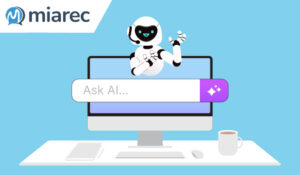AI is no longer a futuristic concept! It’s rapidly becoming a core part of contact centre operations. But is it the “silver bullet” we’ve all been waiting for? Or is there a lot more to it than simply “plug in and play” to reap the promised rewards?
To explore this in more detail, we spoke to Justin Robbins, Martin Jukes, and Nerys Corfield to better understand what really underpins AI success.
AI Is Already Being Used in Multiple Ways Across the Contact Centre
AI adoption is no longer theoretical.
As our 2025 Report: What Contact Centres Are Doing Right Now shows, nearly half of contact centres are already using it, and in the following ways:
- Using AI to retrieve content and contextualize answers (28.9%)
- Using AI to create and prioritize tickets (24.7%)
- Matching the right agents with the right customers (21.9%)
- Recommending improvements to workflows (21.5%)
The integration of these tools improves operational efficiency while enhancing customer satisfaction and agent engagement.
“This extensive shopping list of technologies is taking hold and becoming the key talking points in boardrooms and the CX-focused C-suite. Tools like agent assist, real-time knowledge support, and supervisor support reduce fear and increase confidence in the frontline.” – Nerys Corfield, Director of Injection Consulting
Contact Centre Professionals Expect a Lot From AI
This demand isn’t going away anytime soon either – with respondents highlighting a long list of AI innovations they are most excited to see, including:
- Faster issue resolution (top priority)
- Smarter chat support (to overcome first-generation chatbot limitations)
- AI-driven operational recommendations
Arguably, businesses are right to be excited about these capabilities. The race to deliver optimal AI solutions is creating a continually improving ecosystem, reducing costs, and making tools accessible to more businesses.
The Most Powerful Outcomes of AI Show Up in Human Experience
However, technology adoption alone isn’t enough – it must be embedded in a broader organizational strategy.
That’s why one of the most encouraging trends to see is those taking a holistic view of AI impact – where AI isn’t just being deployed to cut costs, but is being designed to:
- Improve customer experience
- Enhance agent capability
- Reduce operational costs
“The most powerful outcomes of AI show up in human experience. Align AI to reduce customer and employee effort, and the savings follow naturally and sustainably.” – Justin Robbins, Founder of Metric Sherpa
It’s equally important that AI is considered a strategic enabler – not a silver bullet.
And whilst 26.1% of contact centres listing AI as their primary priority for 2026 highlights clear enthusiasm for AI adoption, it also suggests that many are simply slapping “AI” on the wish list and pinning all their hopes on a “silver bullet” to throw at all their contact centre issues.
This is something that should be cautioned against, as Martin Jukes, Managing Director at Mpathy Plus, explains:
“AI is best seen as a solution – not the solution – for the future of contact centres. Organizations must first understand their core challenges before deciding on solutions. AI may well be part of the answer, but it should be implemented with careful planning and expert input.”
What Does Best-Practice AI Implementation Look Like?
A balanced approach therefore prioritizes engagement, culture, and workforce development, alongside efficiency gains. After all, AI should augment human capability, not replace it.
So, how can contact centres excel at AI implementation?
Integrate AI Into Organizational Strategy
AI initiatives should not exist in isolation from broader business goals. Leaders need to ensure that every AI project directly supports operational priorities – whether improving customer service, streamlining workflows, or enhancing decision-making.
Fragmented or experimental projects often fail to scale or demonstrate measurable impact.
Additionally, data centralization is critical. Consolidating data from disparate systems enables AI tools to function at their full potential, producing accurate insights and supporting seamless decision-making across departments.
Focus on Training and Change Management
The success of AI implementation depends heavily on people, not just technology. Employees – especially customer-facing agents – must be equipped with the skills and confidence to collaborate effectively with AI tools.
This requires comprehensive training programmes that focus on both technical proficiency and change readiness.
Organizations should also introduce structured onboarding for new technologies and maintain a culture of continuous learning. Regular refreshers and skill development initiatives ensure teams remain adaptable as AI systems evolve and improve over time.
Don’t Lose Sight of the Human Experience
AI should enhance, not replace, the human experience – for both employees and customers. Leaders should track metrics that extend beyond cost savings or speed, incorporating indicators such as employee satisfaction, engagement, and customer effort scores.
When AI tools are deployed purely for efficiency, they risk undermining the very experiences that drive loyalty and retention.
Placing human experience at the core ensures that AI solutions empower staff, simplify customer interactions, and ultimately contribute to stronger relationships.
Make Time for Continuous Evaluation
AI implementation is not a one-time effort but an ongoing process of refinement. Organizations should establish mechanisms to continuously assess AI’s impact across multiple dimensions, including operational efficiency, employee engagement, and customer satisfaction.
Regular performance reviews and feedback loops allow teams to identify areas for improvement and adjust systems accordingly.
By treating AI as an evolving capability rather than a static tool, organizations can sustain long-term value and stay responsive to changing business and customer needs.
A Multiplier, Not a Replacement
Looking further ahead, the contact centre of the future will likely combine human expertise and AI augmentation.
We’re moving towards a point where all agents will focus on complex, emotionally sensitive interactions, whilst AI will handle the repetitive, data-driven tasks.
Author: Megan Jones
Reviewed by: Xander Freeman
Published On: 29th Oct 2025 - Last modified: 31st Oct 2025
Read more about - Contact Centre Research, Artificial Intelligence (AI), Customer Experience (CX), Five9, Justin Robbins, Martin Jukes, Nerys Corfield, NiCE, NiCE CXone, Peopleware, Research, Scorebuddy, Top Story, Training and Coaching





















